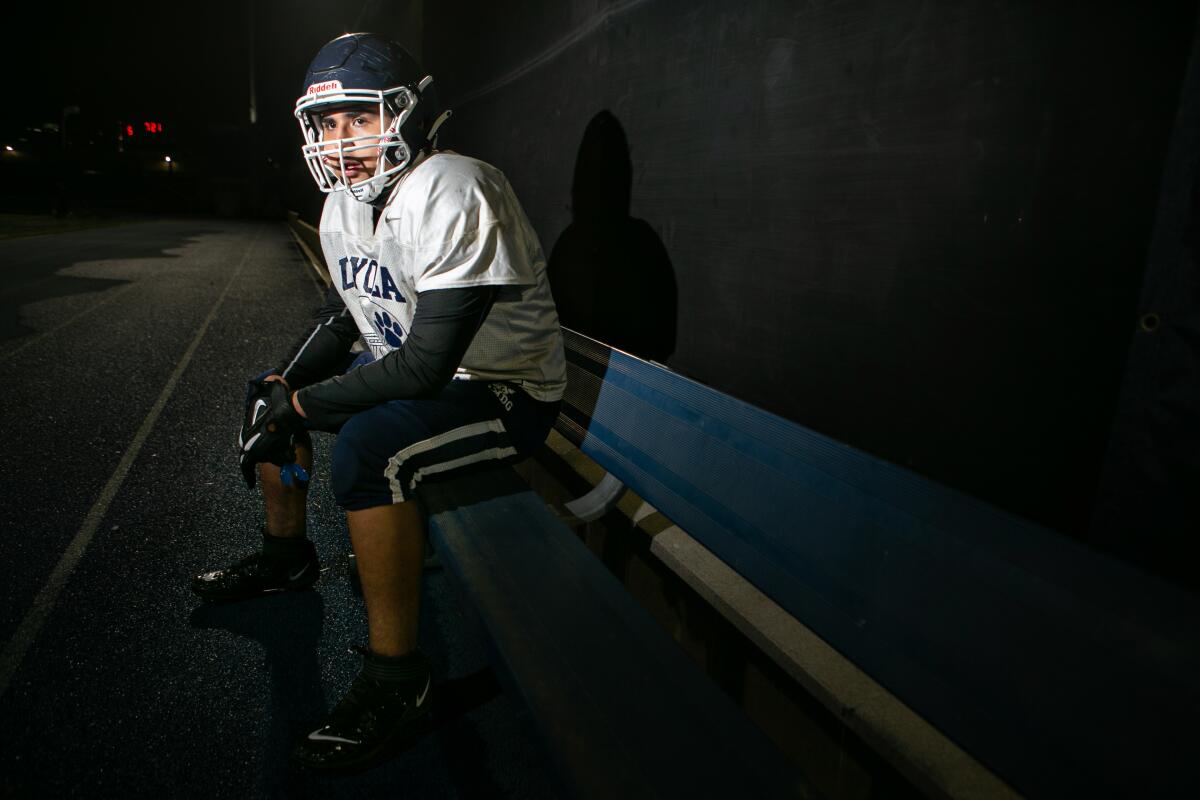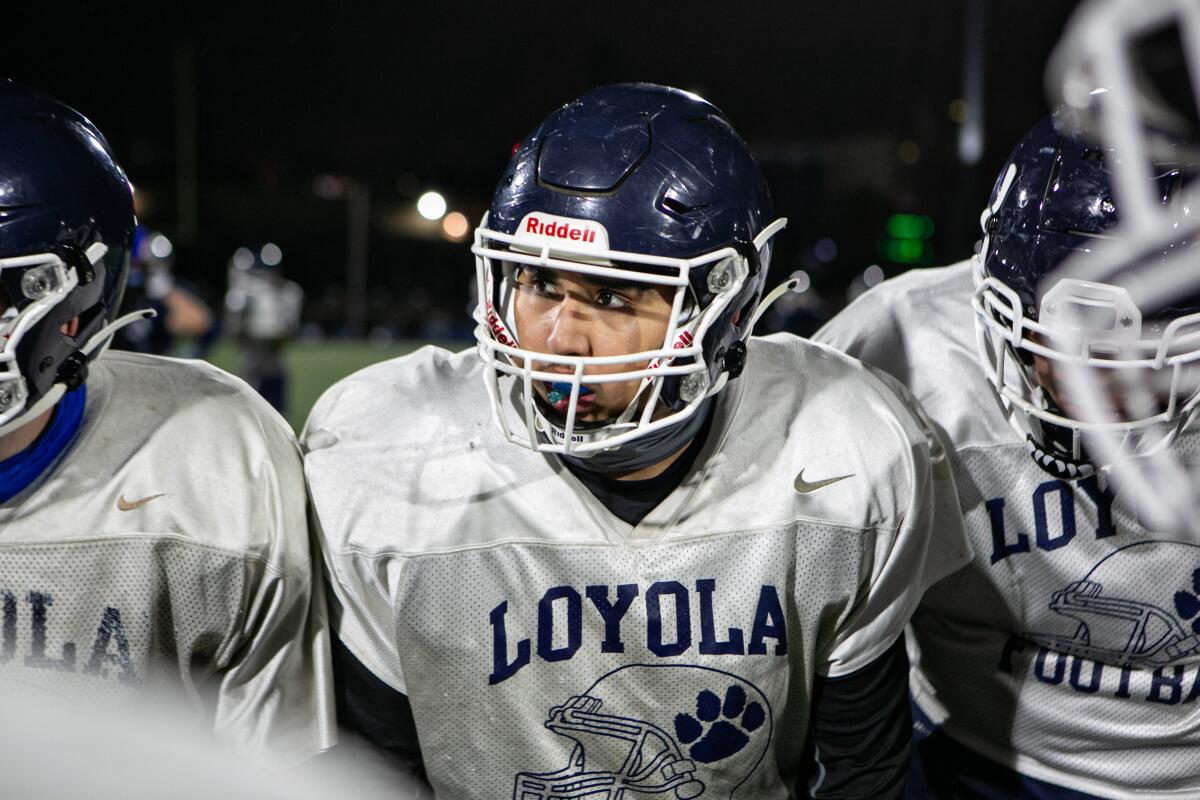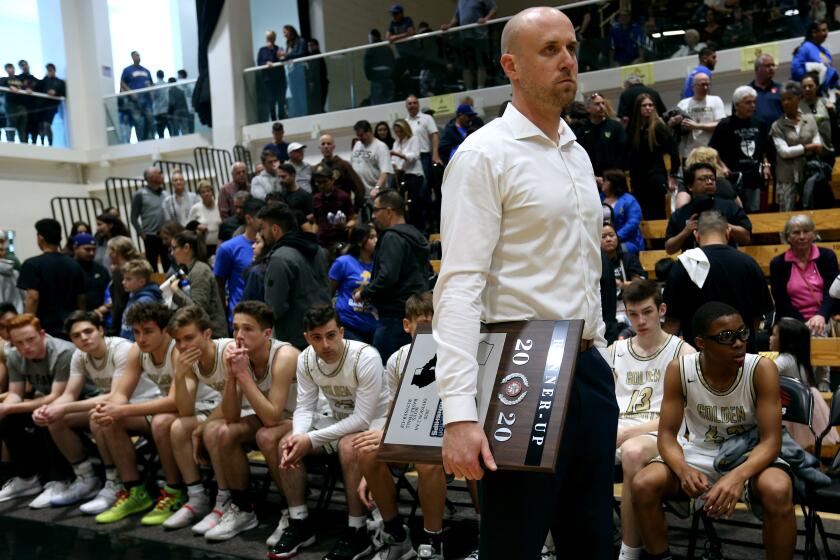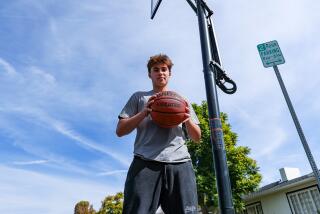Column: Football helped Loyola High senior survive as COVID ripped through his family

The clanging cuts through the downtown chill, louder than the pelting of cold rain, deeper than buzz of neighborhood traffic, the rich sweet sound of freedom.
Josh Morales is punishing a blocking sled.
“I’ve been waiting a long time to hit something,” he says.
The grunting rises above the soggy field, thicker than the hoots and howls, grander than the whistles and horns, the wonderfully warm sound of new life.
Josh Morales is pushing and pushing and pushing a teammate.
“I feel like I’m getting out the anger,” he says.

Hallelujah, shout it to the highest goalposts, the Southland high schools are playing football again, and kids like Josh Morales are finally able to breathe.
The 17-year-old right guard for the Loyola High Cubs throws a forearm, buries a shoulder, drives his legs, powers through this midweek practice that feels like paradise.
“This is me telling everybody, ‘I’m OK,’” he says.
It is the message being delivered these days by thousands of once-suffocated local high school athletes in restarted sports, but it is particularly resounding when coming from Morales, a 220-pound gentle soul for whom football is a respite from a nightmare.
Just down the street from the stately Loyola campus, in a small house in a back lot on a cluttered downtown block, Morales has spent the last year not only in pandemic quarantine, but most recently in abject fear and numbing exhaustion.
A week before Christmas, on the same day, all three members of his household tested positive for COVID-19. His 70-year-old father, Antonio, was eventually hospitalized for 38 days. His mother, Betty, was bedridden for three weeks.
Aching, feverish, fatigued Josh was their caretaker.
He cooked, cleaned, and nursed. He held his father’s trembling hand. He massaged his mother’s aching head. He helped them bathe, washed their sheets, fed them boiled eggs and oatmeal and tea, led them in prayer, then lay frozen awake at 2 a.m. listening to them cough and wheeze.
The World Health Organization announced the coronavirus outbreak had become a pandemic on March 11, 2020. Since then, the virus has seemingly touched all aspects of life in Southern California and beyond. The Times looks back on a full year of life in a pandemic.
At one point, his father was given weeks to live. Another time, his mother was on the verge of being rushed to the hospital. Josh talked to the doctors, administered the Robitussin and Tylenol and Halls, searched for ways to comfort and calm while ignoring the fact that he, himself, was suffering from headaches and chills.
“It was a really tough time for him … our dad was on life support, our mom was on the brink of not making it either, and Joshua had to make sure they both survived while he was also sick,” says older brother Walter, whose parents insisted he remain quarantined outside the house to avoid virus exposure. “Somehow, he pushed through.”
Josh did so while dreaming of football. He is not a college prospect, this senior season would be his last, he doesn’t even own a regulation ball. But during rare quiet moments when both parents were resting and his head wasn’t pounding, he lay on his bed and tossed a tiny USC souvenir ball into the air and visualized being on a field again.
“One last season, being in the huddle, picking each other up, the bonding we created, our brother-ship,” he says. “I was really missing all that.”
Now he’ll have it, five official games beginning next Friday at Upland — no playoffs or championship but no matter, it’s sports, it’s football, it’s life.
“A candle has been re-lit inside of him,” says Walter.
You can see it during that midweek practice, after one play in which he shoves a defender nearly off the field and onto the track. As he runs back to his teammates, he opens his mouth wide enough to see his braces beneath his mouthpiece and a hint of his wispy mustache.
Josh Morales is smiling again.
“One last season, being in the huddle, picking each other up, the bonding we created, our brother-ship. I was really missing all that.”
— Loyola High senior lineman Josh Morales
On the wall next to Josh Morales’ bedroom door hangs a whiteboard. It is the first thing he sees every morning when he wakes up. Each week he uses a Sharpie to adorn it with a different inspirational quote.
“Believe in yourself, don’t quit, the light at the end of the tunnel is right there.”
“It’s not the size of the dog in the fight, it’s the size of the fight in the dog.”
“Don’t let your alarm clock be the only reason you wake up.”
“The quotes inspire me to be a better person, to push toward my dreams, to not give up,” he says.
His resilience in chasing those dreams is epitomized by his football career, which essentially didn’t begin until he enrolled in Loyola as a ninth grader. Before then, he had only played flag football. But after watching his five much older brothers come home happy after their tackle practices, he knew he was ready for the next step.
“I could see that football taught you about more than just the game,” he says. “It taught you about accountability, responsibility, trusting others, leadership, and I wanted to be part of that.”
It initially taught him about the bench. He only played in half the games as a freshman then, after starting as a sophomore on the junior varsity, he was back on the bench as a junior. Undaunted, he performed well on special teams and by the spring before his senior season, he used his intangibles to force his way on to the field as a starter at right guard, number 77, not the biggest kid but one of the toughest and smartest.
“He has great work ethic, great leadership, a selfless kid,” says Loyola coach Drew Casani. “He worked himself into a good player.”
Throughout the first months of the pandemic, Morales remained hopeful of enjoying that starting job, hopeful that there would eventually be a season, and, beginning in September, he happily participated in the team’s three-days-a-week socially distanced agility workouts.
“I was really hoping that eventually, I would get one last ride,” he says.
High school sports have resumed after the COVID-19 shutdown. Here is how it touched aspects of athletes’ lives, from school to training to recruiting.
Then, in the second week of December, his mother started coughing. Then he became feverish. Then his father, a retired Vietnam veteran who has survived both colon and throat cancer, began gasping for air.
On Dec. 18, all three visited a nearby park for COVID-19 testing. Within 15 minutes, all three learned they had tested positive. They immediately returned home and quarantined in each of the three bedrooms out of fear they would make each other sicker.
His mother’s condition worsened. His father’s condition worsened. Josh’s condition also worsened, but he needed to run the household, so his answer to his worried parents was always the same:
“I’m strong, nothing is going to happen to me.”
He would cook their meals and leave them with their medicines outside their doors. He would collect their dirty laundry and hand the clean clothes through a crack in the door. He would break the quarantine to check on his father’s breathing or to lay with his frightened mother while wearing their masks.
“My son,” Betty recalls with a quiet sob. “My son, he becomes the air that we breathed.”
Christmas came and went without any presents under their makeshift artificial tree because there was little money to buy them and no energy to enjoy them.
A day later, Josh noticed his father was barely breathing, so he and his brother Walter drove him to the hospital, where Antonio was put on a ventilator. He remained hospitalized for 38 days. Suddenly Josh was dealing with doctors, treatment options, an unimaginable mess. He had one sick father on life support, one sick mother at home and an overwhelming confusion about how to handle it all.
He talked nightly with Ciaran O’Lionain, Loyola’s senior center whose mother is a nurse. He called for advice. He needed a shoulder.
“There was one point he had no idea what was going on — he had three different doctors telling him three different things, he was lost,” says O’Lionain. “The way he persevered was remarkable.”
Three weeks after his father was admitted, doctors called with the news that he was declining with little hope for recovery. He was given mere weeks to live. What did the family want to do?
For the first and only time during the ordeal, Josh Morales finally broke down, weeping for what he estimates was 30 solid minutes, collapsing under the weight of it all.
“I can’t take it anymore,” he told his mother.
Then he brought her some cough drops, massaged her head and washed the dishes.
“All my son has been through, never complaining, trying not to show any emotion,” recalls Betty. “I can never ask anything more of my son, ever.”
Josh and his family demanded new doctors. His father was put on different medication. He began to improve. His mother was also improving. Meanwhile, the Loyola family was rallying around them.
Josh was given a scholarship for the rest of the academic year. Teammates prayed for him after workouts. School families offered meals. School counselors phoned frequently. Teachers would excuse him from his virtual classes so he could bring his dehydrated mother Pedialyte. He texted nearly every day with his offensive line boss, longtime Loyola assistant coach Rick Pedroarias.

“The philosophy at Loyola is, you put others before you, you look outward,” says Pedroarias. “Josh embodies that. He was there for his parents. This is a story that goes way beyond football.”
His father eventually returned from the hospital. His mother eventually returned to work in the garment district. Then football returned to the field, and Josh was freed. He came back to the team after missing nearly two months of workouts, and his starting job and a huddle full of admiration was waiting for him.
“Everything in his life that could go wrong went wrong, but he hung in there for a chance to get back out there and be with his friends,” says Casani, one of countless Southland coaches who did the heroic work of keeping their athletes motivated during a year of inactivity. “What sports gives to kids is vital, one of the biggest components in social development is that social interaction. You can’t put a value on it and everyone has learned that now.”
Morales is still occasionally short of breath. He still battles fatigue. But he lights up when talking about his first real hit, on a goal line drill, when he and O’Lionain double-teamed a linebacker and opened a hole for a running back to score.
“Right up the gut,” he remembers. “We made a huge pile. It felt good. It felt great. lt was letting out all those things I’ve been holding inside.”
After the five-game season, Morales’ football career will be done, and he is amazingly scheduled to graduate with a 3.7 GPA. He hopes to study engineering and become the first member of his family to earn a four-year college degree.
In his bedroom, on his whiteboard, next to the inspirational quote, Morales has scrawled the names of the several universities where he has been accepted, and the name of his dream school whose decision has not yet been delivered.
It is the school whose name is on that tiny football he tossed to himself while in quarantine, the football that helped him keep pushing.
Just a guess, but USC might greatly value a student who defines “Fight on.”









